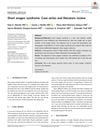2 citations,
January 2014 in “Indian dermatology online journal” A person was born with both a rare hairless condition and a type of birthmark, which is an uncommon combination.
 19 citations,
May 2006 in “Clinical and Experimental Dermatology”
19 citations,
May 2006 in “Clinical and Experimental Dermatology” Researchers found a new mutation causing total hair loss from birth.
[object Object] 3 citations,
January 2013 in “Dermatology” New genetic mutations causing hair loss were found in a Chinese family.
 23 citations,
November 2001 in “Archives of Dermatology”
23 citations,
November 2001 in “Archives of Dermatology” Genetic discoveries are key for understanding, diagnosing, and treating inherited hair and nail disorders.
 March 2023 in “International journal of trichology”
March 2023 in “International journal of trichology” Six genetic conditions are often linked to complete scalp hair loss in children.
 January 2006 in “Advances in developmental biology”
January 2006 in “Advances in developmental biology” The Hairless gene is crucial for healthy skin and hair growth.
3 citations,
January 2015 in “Indian journal of paediatric dermatology” Oral isotretinoin temporarily improved skin symptoms in a child with IFAP syndrome.

Researchers found a genetic link for hereditary hair loss but need more analysis to identify the exact gene.
 July 2015 in “Hair transplant forum international”
July 2015 in “Hair transplant forum international” Facial hair transplants are generally successful, with hair growth beginning around 3 months post-surgery.
 31 citations,
May 2008 in “Drug Discovery Today: Disease Mechanisms”
31 citations,
May 2008 in “Drug Discovery Today: Disease Mechanisms” Different hair growth problems are caused by genetic issues or changes in hair growth cycles, and new treatments are being developed.
 5 citations,
September 2013 in “The Journal of Dermatology”
5 citations,
September 2013 in “The Journal of Dermatology” Researchers found a new mutation in the HR gene causing hair loss and skin bumps in a Pakistani family.
 14 citations,
July 2001 in “American Journal of Human Genetics”
14 citations,
July 2001 in “American Journal of Human Genetics” Haplogroup X found in Altaian population supports Amerindian origin.
 3 citations,
February 2020 in “The journal of gene medicine”
3 citations,
February 2020 in “The journal of gene medicine” A mutation in the HR gene causes a rare form of irreversible hair loss in two Kashmiri families. Whole exome sequencing is effective for finding such mutations.
April 2012 in “Journal of evolution of medical and dental sciences” No effective treatment exists to stimulate hair growth in atrichia with papular lesions.
 4 citations,
January 2011 in “Annals of Dermatology”
4 citations,
January 2011 in “Annals of Dermatology” Researchers found a new mutation in the HR gene linked to a rare hair loss condition.
 3 citations,
March 2010 in “Dermatologica Sinica”
3 citations,
March 2010 in “Dermatologica Sinica” A Taiwanese patient had hair loss and skin bumps without the usual gene mutation, suggesting other genetic factors might be involved.
139 citations,
September 2001 in “The journal of investigative dermatology/Journal of investigative dermatology” Mutations in the Vitamin D receptor gene can cause hair loss similar to mutations in the Hairless gene.
 7 citations,
December 2015 in “International Journal of Dermatology”
7 citations,
December 2015 in “International Journal of Dermatology” New and known mutations in the hairless gene cause a hair loss condition called Atrichia with papular lesions.
 43 citations,
December 2013 in “Seminars in Cell & Developmental Biology”
43 citations,
December 2013 in “Seminars in Cell & Developmental Biology” Genetic mutations can cause hair growth disorders by affecting key genes and signaling pathways.
 12 citations,
February 2008 in “Journal of The American Academy of Dermatology”
12 citations,
February 2008 in “Journal of The American Academy of Dermatology” Combining skin tissue pathology with genetics has greatly improved the diagnosis and understanding of certain skin diseases.
 10 citations,
February 2008 in “Photochemistry and photobiology”
10 citations,
February 2008 in “Photochemistry and photobiology” Vitamin D receptor can control the hairless gene linked to hair loss even without vitamin D.
 7 citations,
December 2008 in “Expert Review of Dermatology”
7 citations,
December 2008 in “Expert Review of Dermatology” The document concludes that various childhood hair and nail disorders exist, some may improve on their own, and advances in genetics and immunology could enhance treatment and counseling.
 38 citations,
June 2003 in “Journal of Investigative Dermatology Symposium Proceedings”
38 citations,
June 2003 in “Journal of Investigative Dermatology Symposium Proceedings” Accurate clinical, histological, and genetic methods are key for understanding and treating hair disorders.
[object Object]  30 citations,
January 2009 in “Nuclear Receptor Signaling”
30 citations,
January 2009 in “Nuclear Receptor Signaling” Hairless protein is crucial for healthy skin and hair, and its malfunction can cause hair loss.
 16 citations,
December 2006 in “Expert Review of Dermatology”
16 citations,
December 2006 in “Expert Review of Dermatology” Hair follicles are essential for skin health, aiding in hair growth, wound healing, and immune function.
 November 2019 in “Harper's Textbook of Pediatric Dermatology”
November 2019 in “Harper's Textbook of Pediatric Dermatology” Understanding normal hair growth and loss in children is key to diagnosing and treating hair disorders.
 13 citations,
March 2018 in “Pediatric Dermatology”
13 citations,
March 2018 in “Pediatric Dermatology” Children with short anagen syndrome usually see their hair condition improve as they get older.
 20 citations,
November 2012 in “Journal der Deutschen Dermatologischen Gesellschaft”
20 citations,
November 2012 in “Journal der Deutschen Dermatologischen Gesellschaft” Hair diseases can have psychological effects and should be treated with a combination of psychosomatic care, therapy, and medication.
 181 citations,
January 2009 in “Nature Genetics”
181 citations,
January 2009 in “Nature Genetics” Certain mutations in a hair growth-related gene cause a type of genetic hair loss.
 70 citations,
January 2015 in “Journal of Clinical and Diagnostic Research”
70 citations,
January 2015 in “Journal of Clinical and Diagnostic Research” Hair loss from Telogen Effluvium usually gets better within 6 months after addressing the cause.
























